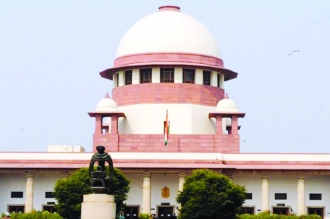The supreme court on Tuesday, declared that Article 370 of the constitution has acquired permanent status through years of existence. This will limit the power of Central government to make laws for the state – Jammu and Kashmir.
In any other country, the Supreme Court‘s observations on Tuesday that Article 370 of the Constitution conferring special status to the State of Jammu and Kashmir by limiting the powers of the Union Government and allowing the State Government to legislate independent laws would have sparked widespread public debate. Instead, caught up as our politicians – both those who support and those who oppose Article 370 — are in a discourse informed by competitive sloganeering sans substance, and that too in an election year, nobody is talking about it.
Hearing a petition seeking the declaration of Article 370 as a temporary provision which lapsed with the dissolution of the Jammu and Kashmir Constituent Assembly on January 26, 1957, the petitioner also sought a declaration that State Constitution of Jammu and Kashmir was void, inoperative and ultra vires of the Constitution of India. The petition has been filed at a time when the validity of Article 35A of the Constitution has also been challenged for denying women marrying outside the State the right to inheritance and restricting their employment while the same does not apply to men. It is in this context that the Bench referred to a 2017 apex court verdict as having “settled” the challenge to Article 370 by ruling that the provision had acquired permanence as it could no longer be abrogated, given the Jammu and Kashmir Constituent Assembly had ceased to exist and the President would therefore be unable to get fulfil the mandatory requirement of getting its recommendation for scrapping the Article. The Bench directed the Centre to formulate its response in three weeks, when the next hearing of the ongoing matter has been scheduled. The Additional Solicitor-General assured the Court the implication of the judgment would be studied by Government.
Verily, the cat has been set among the pigeons. The Government must respond both legally, as is its duty, and politically, as it is its moral obligation to given the ruling party’s long standing demand that Article 370 must be abrogated. While better legal minds than ours are seized of the matter, it stands to reason that the obvious line of argument to take is that the State Assembly of Jammu and Kashmir, as the successor to the State’s Constituent Assembly and born of it, would be a perfectly competent authority to make the recommendation to the President. The intention behind the requirement for a recommendation was clearly to ensure the people, through their representatives, had a say in the matter and that condition is adequately and fully met by reference to the State Assembly duly elected by universal adult franchise. Further, it may be argued that as compared to the Constituent Assembly, the State Assembly is a more representative body. There also needs to be a legal distinction drawn between the plea to strike down Article 35A, which is on the grounds of denial of gender equality, and that of the abrogation of Article 370, which relates to territorial jurisdiction of the Indian state which is Constitutionally bound not to deny any person equality before the law within the “territory of India”. If one accepts, as we do, Jammu and Kashmir as an integral part of India, there can be no question of Article 370 being allowed to stand. Ditto, if we affirm that there can be no discrimination on the basis of gender in India, Article 35A too must go.
Politically, the sober elements in the BJP and other one India forces including right-thinking sections of the Congress have their work cut out given the heightened expectations that some movement towards the abrogation of Article 370 would be made given the mandate in the General Election of 2014. The patience of the Indian people is not infinite.
Writer: Pioneer
Courtesy: The Pioneer








 OpinionExpress.In
OpinionExpress.In















Comments (0)